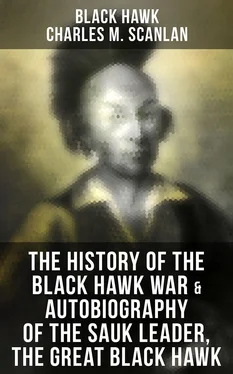Having heard the principal war chief had come up with a number of troops, and commenced the erection of a fort near the Rapids des Moines, we consented to go down with the traders to visit the American chief, and tell him the reason why we had not been down sooner. When we arrived at the head of the rapids, the traders left their goods, and all of their boats with one exception, in which they accompanied us to see the Americans. We visited the war chief on board his boat, telling him what we had to say, and explaining why we had not been down sooner. He appeared angry and talked to La Gutrie for some time. I inquired of him what the war chief said. He told me that he was threatening to hang him up to the yard arm of his boat. "But" said he, "I am not afraid of what he says. He dare not put his threats into execution. I have done no more than I had a right to do a. a British subject."
I then addressed the chief, asking permission for ourselves and some Menomonees, to go down to the Two River country for the purpose of hunting. He said we might go down but must return before the ice came, as he did not intend that we should winter below the fort. "But," he inquired, "what do you want the Menomonee to go with you for?"
I did not know at first what reply to make, but told him that they had a great many pretty squaws with them, and we wished them to go with us on that account. He consented. We all went down the river and remained all winter, as we had no intention of returning before spring when we asked leave to go. We made a good hunt. Having loaded our trader's boats with furs and peltries, they started to Mackinac, and we returned to our village.
There is one circumstance that I did not relate at the proper place. It has no reference to myself or people, but to my friend Gomo, the Pottawattomie chief. He came to Rock river to pay me a visit, and during his stay he related to me the following story:
"The war chief at Peoria is a very good man. He always speaks the truth and treats our people well. He sent for me one day, told me he was nearly out of provisions, and wished me to send my young men hunting to supply his fort. I promised to do so, immediately returned to my camp and told my young men the wishes and wants of the war chief. They readily agreed to go and hurt for our friend and returned with plenty of deer. They carried them to the fort, laid them down at the gate and returned to our camp. A few days afterward I went again to the fort to see if they wanted any more meat. The chief gave me powder and lead and said he wanted, me to send my hunters out again. When I returned to camp, I told my young men that the chief wanted more meat. Matatah, one of my principal braves, said he would take a party and go across the Illinois, about one day's travel, where game was plenty, and make a good hunt for our friend the war chief. He took eight hunters with him, and his wife and several other squaws went with them. They had travelled about half the day in the prairie when they discovered a party of white men coming towards them with a drove of cattle. Our hunters apprehended no danger or they would have kept out of the way of the whites, who had not yet perceived them. Matatah changed his course, as he wished to meet and speak to the whites. As soon as the whites saw our party, some of them put off at full speed, and came up to our hunters. Matatah gave up his gun to them, and endeavored to explain to them that he was friendly and was hunting for the war chief. They were not satisfied with this but fired at and wounded him. He got into the branches of a tree that had blown down, to keep the horses from running over him. He was again fired on several times and badly wounded. He, finding that he would be murdered, and, mortally wounded already, sprang at the man nearest him, seized his gun and shot him from his horse. He then fell, covered with blood from his wounds, and immediately expired. The other hunters being in the rear of Matatah attempted to escape, after seeing their leader so basely murdered by the whites. They were pursued and nearly all of the party killed. My youngest brother brought me the news in the night, he having been with the party and was slightly wounded. He said the whites had abandoned their cattle and gone back towards the settlement. The rest of the night we spent in mourning for our friends. At daylight I blacked my face and started for the fort to see the chief. I met him at the gate and told him what had happened. His countenance changed and I could see sorrow depicted in it for the death of my people. He tried to persuade me that I was mistaken, as he could not believe that the whites would act so cruelly. But when I convinced him, he said to me, 'those cowards who murdered your people shall be punished.' I told him that my people would have revenge, that they would not trouble any of his people at the fort, as we did not blame him or any of his soldiers, but that a party of my braves would go towards the Wabash to avenge the death of their friends and relations. The next day I took a party of hunters, killed several deer, and left them at the fort gate as I passed."
Here Gomo ended his story. I could relate many similar ones that have come within my own knowledge and observation, but I dislike to look back and bring on sorrow afresh. I will resume my narrative.
The great chief at St. Louis having sent word for us to come down and confirm the treaty, we did not hesitate, but started immediately that we might smoke the peace pipe with him. On our arrival we met the great chiefs in council. They explained to us the words of our Great Father at Washington, accusing us of heinous crimes and many misdemeanors, particularly in not coming down when first invited. We knew very well that our Great Father had deceived us and thereby forced us to join the British, and could not believe that he had put this speech into the mouths of those chiefs to deliver to us. I was not a civil chief and consequently made no reply, but our civil chiefs told the commissioner that, "What you say is a lie. Our Great Father sent us no such speech, he knew that the situation in which we had been placed was caused by him." The white chiefs appeared very angry at this reply and said, "We will break off the treaty and make war against you, as you have grossly insulted us."
Our chiefs had no intention of insulting them and told them so, saying, "we merely wish to explain that you have told us a lie, without any desire to make you angry, in the same manner that you whites do when you do not believe what is told you." The council then proceeded and the pipe of peace was smoked.
Here for the first time, I touched the goose quill to the treaty not knowing, however, that, by the act I consented to give away my village. Had that been explained to me I should have opposed it and never would have signed their treaty, as my recent conduct will clearly prove.
What do we know of the manners, the laws, and the customs of the white people? They might buy our bodies for dissection, and we would touch the goose quill to confirm it and not know what we were doing. This was the case with me and my people in touching the goose quill for the first time.
We can only judge of what is proper and right by our standard of what is right and wrong, which differs widely from the whites, if I have been correctly informed. The whites may do wrong all their lives, and then if they are sorry for it when about to die, all is well, but with us it is different. We must continue to do good throughout our lives. If we have corn and meat, and know of a family that have none, we divide with them. If we have more blankets than we absolutely need, and others have not enough, we must give to those who are in want. But I will presently explain our customs and the manner in which we live.
We were treated friendly by the whites and started on our return to our village on Rock river. When we arrived we found that the troops had come to build a fort on Rock Island. This, in our opinion, was a contradiction to what we had done—"to prepare for war in time of peace." We did not object, however, to their building their fort on the island, but were very sorry, as this was the best one on the Mississippi, and had long been the resort of our young people during the summer. It was our garden, like the white people have near their big villages, which supplied us with strawberries, blackberries, gooseberries, plums, apples and nuts of different kinds. Being situated at the foot of the rapids its waters supplied us with the finest fish. In my early life I spent many happy days on this island. A good spirit had charge of it, which lived in a cave in the rocks immediately under the place where the fort now stands. This guardian spirit has often been seen by our people. It was white, with large wings like a swan's, but ten times larger. We were particular not to make much noise in that part of the island which it inhabited, for fear of disturbing it. But the noise at the fort has since driven it away, and no doubt a bad spirit has taken its place.
Читать дальше





![Theresa Cheung - The Dream Dictionary from A to Z [Revised edition] - The Ultimate A–Z to Interpret the Secrets of Your Dreams](/books/692092/theresa-cheung-the-dream-dictionary-from-a-to-z-r-thumb.webp)






